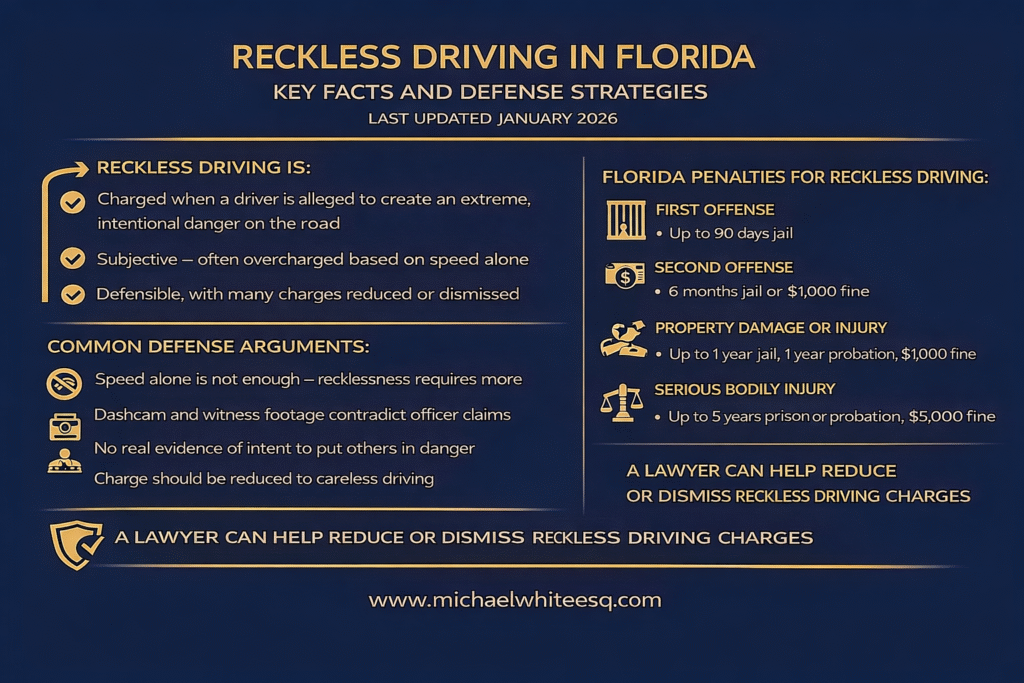Last updated January 2026
🚗 Reckless Driving in Florida: What You Need to Know
Reckless driving is one of the most overcharged traffic crimes in Florida. What starts as speeding, aggressive driving, or a questionable traffic stop is often escalated into a criminal charge — even when the facts don’t support it.
Unlike careless driving, reckless driving is a criminal offense that can lead to jail, probation, license consequences, and a permanent record. But it is also highly defensible when handled correctly.
This page explains how reckless driving is actually charged, how prosecutors try to prove it, and the most effective ways these cases are reduced or dismissed in Florida courts.
⚖️ What Counts as Reckless Driving in Florida?
Under Florida law, reckless driving requires more than bad driving or a mistake. To convict someone, the State must prove beyond a reasonable doubt that:
You were driving a motor vehicle, and
You acted with willful or wanton disregard for the safety of people or property
That legal standard is much higher than negligence — and that’s where many cases fall apart.
What “Willful or Wanton” Really Means
Willful means intentional, purposeful conduct
Wanton means a conscious decision to ignore a known risk likely to cause harm
Speed alone, momentary poor judgment, or a single traffic violation usually is not enough.
🚨 Why Reckless Driving Is Often Overcharged
Reckless driving is subjective. Officers frequently rely on:
Their personal opinion
Speed estimates
Assumptions about danger
But criminal charges require proof, not conclusions.
Common overcharging scenarios include:
High speed with no actual danger to others
Lane changes without near-misses or collisions
Alleged “aggressive driving” without video evidence
Situations that support careless driving, not recklessness
In many cases, reckless driving is charged simply because it allows police or prosecutors more leverage.
🛡️ Common Defenses to Reckless Driving Charges
Reckless driving cases are frequently reduced or dismissed when the evidence is examined closely.
🔹 Speed Alone Is Not Enough
Excessive speed, by itself, does not automatically equal recklessness. The State must show actual danger, not just a number on a speedometer.
🔹 No Real Evidence of Intent or Danger
Dashcam footage, bodycam video, or witness testimony often contradicts claims of willful or wanton conduct.
If no one was endangered, the charge may not hold.
🔹 Officer Opinion vs. Objective Facts
Reckless driving cannot be proven by opinion alone. Courts require specific, articulable facts showing conscious disregard for safety.
🔹 Reduction to Careless Driving
One of the most common outcomes in reckless driving cases is a reduction to careless driving, which is a civil infraction — not a crime.
🔹 Dismissal After Discovery
When evidence is weak or inconsistent, reckless driving charges are often dismissed after discovery, depositions, or motion practice.
📋 Florida Penalties for Reckless Driving
Penalties depend on the circumstances and any resulting damage or injury:
🔸 First Offense (No Injury or Damage)
Second-degree misdemeanor
Up to 90 days in jail
Up to 6 months probation
Up to $500 fine
🔸 Second Offense
Second-degree misdemeanor
Up to 6 months jail
Up to $1,000 fine
🔸 Reckless Driving With Property Damage or Injury
First-degree misdemeanor
Up to 1 year jail
Up to 1 year probation
Up to $1,000 fine
🔸 Reckless Driving With Serious Bodily Injury
Third-degree felony
Up to 5 years in prison or probation
Up to $5,000 fine
🚦 How Reckless Driving Fits Into Florida Traffic Crimes
Reckless driving sits at the intersection between civil traffic violations and serious criminal charges. Because it is a criminal offense, a conviction can affect:
Your criminal record
Insurance rates
Professional licensing
Immigration status
Future traffic cases
Repeated reckless driving convictions can also increase exposure to Habitual Traffic Offender (HTO) consequences.
👉 Learn more about criminal traffic offenses in Florida
👨⚖️ Fort Lauderdale Reckless Driving Defense Lawyer
If you’ve been charged with reckless driving in Fort Lauderdale or anywhere in South Florida, do not assume the charge will “work itself out.”
As a former prosecutor, Michael White understands how reckless driving cases are built — and how they’re taken apart. Early legal intervention often makes the difference between a criminal conviction and a reduced or dismissed charge.
📞 Call (954) 270-0769 or schedule a free consultation to protect your record and your future.
❓ Reckless Driving in Florida – FAQs
What’s the difference between reckless and careless driving?
Reckless driving requires proof of willful or wanton disregard for safety. Careless driving is based on simple negligence and is a civil infraction.
Is reckless driving a felony in Florida?
Usually no, but it becomes a felony if serious bodily injury is involved.
Can reckless driving charges be reduced?
Yes. Many cases are reduced to careless driving or dismissed entirely when the evidence is challenged.
Will reckless driving show up on my criminal record?
Yes. Reckless driving is a criminal offense and appears on your record if convicted.
Can I go to jail for reckless driving?
Yes, particularly for repeat offenses or cases involving injury or damage — but jail is often avoidable with proper defense strategy.

